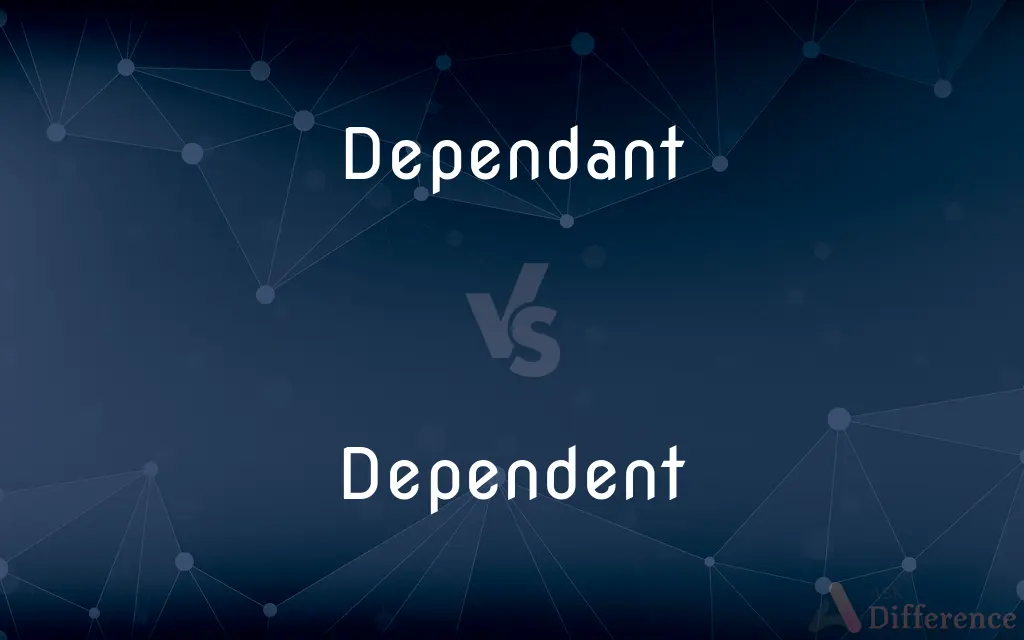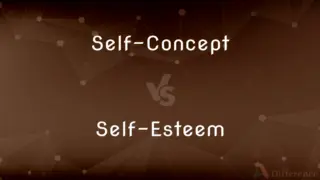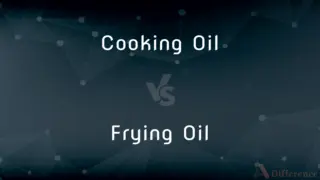Dependant vs. Dependent — What's the Difference?
Edited by Tayyaba Rehman — By Fiza Rafique — Published on October 24, 2023
"Dependant" is incorrect in American English; the correct spelling is "Dependent," referring to someone who relies on another or something conditioned by another.

Difference Between Dependant and Dependent
Table of Contents
ADVERTISEMENT
Key Differences
Remember "Dependent" ends with "-ent," much like "student" or "resident."
Think of "depend" + "ent" to form "Dependent."
Visualize the "e" in the middle as two pillars supporting (or depending on) each other.
In American English, associate "Dependent" with "Dependence" – both end with "e."
Think of someone "depending" on another for help; the "e" can remind you of "help."
ADVERTISEMENT
Compare with Definitions
Dependant
Dependant is an incorrect spelling of Dependent.
Dependent
Conditioned or determined by something else.
Success is dependent on hard work and dedication.
Dependent
Subordinate; subject to a duty or obligation.
The smaller nation was dependent on its larger neighbor for defense.
Dependent
Determined, influenced, or controlled by something else.
Dependent
(Grammar) Subordinate to another clause, phrase, or word.
Dependent
Relying on or requiring the aid or support of another
Adult children who are still dependent on their parents.
Dependent
Needing to continue use of a drug or other substance or engagement in a specific activity in order to avoid experiencing withdrawal symptoms
Dependent on alcohol.
Dependent
(Archaic) Hanging down.
Dependent
Also de·pen·dant One who relies on another, especially for financial support.
Dependent
Relying upon; depending upon.
At that point I was dependent on financial aid for my tuition.
Dependent
(statistics) Having a probability that is affected by the outcome of a separate event.
Dependent
Used after a particle (with one or two exceptions), such as those which express questions, subordinate clauses, and negative sentences.
Dependent
(medicine) Affecting the lower part of the body, such as the legs while standing up, or the back while supine.
Dependent
Hanging down.
A dependent bough or leaf
Dependent
(US) One who relies on another for support
With two children and an ailing mother, she had three dependents in all.
Dependent
(grammar) An element in phrase or clause structure that is not the head. Includes complements, modifiers and determiners.
Dependent
(grammar) The aorist subjunctive or subjunctive perfective: a form of a verb not used independently but preceded by a particle to form the negative or a tense form. Found in Greek and in the Gaelic languages.
Dependent
Hanging down; as, a dependent bough or leaf.
Dependent
Relying on, or subject to, something else for support; not able to exist, or sustain itself, or to perform anything, without the will, power, or aid of something else; not self-sustaining; subordinate; - often with on or upon; as, dependent on God; dependent upon friends. Opposite of independent.
England, long dependent and degraded, was again a power of the first rank.
Dependent
Conditional; contingent or conditioned. Opposite of unconditional.
Dependent
Addicted to drugs.
Dependent
One who depends; one who is sustained by another, or who relies on another for financial support or favor; a hanger-on; a retainer; as, a numerous train of dependents.
A host of dependents on the court, suborned to play their part as witnesses.
Dependent
That which depends; corollary; consequence.
With all its circumstances and dependents.
Dependent
A person who relies on another person for support (especially financial support)
Dependent
Not independent;
Dependent children
Dependent
Contingent on something else
Dependent
Of a clause; unable to stand alone syntactically as a complete sentence;
A subordinate (or dependent) clause functions as a noun or adjective or adverb within a sentence
The main (or independent) clause in a complex sentence has at least a subject and a verb
Dependent
Being under the power or sovereignty of another or others;
Subject peoples
A dependent prince
Dependent
Addicted to a drug
Dependent
A person relying on another for financial or emotional support.
Children are often the dependents of their parents.
Dependent
Requiring someone or something for aid, support, or the like.
The plant is dependent on sunlight for growth.
Dependent
Relying on or requiring the care of someone.
After the surgery, she was temporarily dependent on her family.
Common Curiosities
What is the verb form of Dependent?
The verb form is "depend."
What is the root word of Dependent?
The root word is "depend."
What is the plural form of Dependent?
The plural form is "dependents."
Which conjunction is used with Dependent?
Any conjunction can be used with "dependent" depending on the context; there's no specific conjunction exclusive for it.
Which vowel is used before Dependent?
The letter "e" is used before "pendent."
What is the pronunciation of Dependent?
Dependent is pronounced as /dɪˈpɛndənt/.
Which article is used with Dependent?
Articles such as "the" or "a" can be used depending on the context.
Why is it called Dependent?
It's called "Dependent" because it denotes someone or something that relies or is contingent upon another.
Which preposition is used with Dependent?
"On" is commonly used, as in "dependent on."
Is Dependent a vowel or consonant?
"Dependent" is a word composed of both vowels and consonants.
Is Dependent a noun or adjective?
"Dependent" can function as both a noun and an adjective.
Is Dependent an abstract noun?
No, "dependent" when used as a noun refers to a person and is not abstract.
Is Dependent a countable noun?
When used as a noun referring to a person, "dependent" is countable.
Is Dependent a collective noun?
No, "dependent" is not a collective noun.
Is the Dependent term a metaphor?
No, "dependent" is a direct term, but it can be used metaphorically in certain contexts.
Is the word Dependent imperative?
No, "dependent" is not used in the imperative mood.
Is the word Dependent a Gerund?
No, "dependent" is not a gerund.
How do we divide Dependent into syllables?
De-pend-ent.
What is a stressed syllable in Dependent?
The second syllable "pend" is stressed.
Which determiner is used with Dependent?
Determiners like "this," "that," "my," or "our" can be used with "dependent" based on context.
What is the singular form of Dependent?
"Dependent" itself is singular.
Is the word “Dependent” a Direct object or an Indirect object?
"Dependent" can serve as a direct object depending on the sentence structure.
How many syllables are in Dependent?
There are three syllables in "dependent."
What is the opposite of Dependent?
The opposite is "independent."
What part of speech is Dependent?
"Dependent" can be an adjective or a noun depending on its usage.
What is another term for Dependent?
Another term for dependent could be "reliant."
What is the third form of Dependent?
For the verb "depend," the third form is also "depended."
How is Dependent used in a sentence?
"The young child is dependent on his parents for care and support."
Is Dependent an adverb?
No, "dependent" is not an adverb.
Is Dependent a negative or positive word?
"Dependent" is neutral; its connotation is based on context.
What is the first form of Dependent?
The adjective "dependent" doesn't have verb forms, but its root verb "depend" is the first form.
What is the second form of Dependent?
For the verb "depend," the second form is "depended."
Share Your Discovery

Previous Comparison
Self-Concept vs. Self-Esteem
Next Comparison
Cooking Oil vs. Frying OilAuthor Spotlight
Written by
Fiza RafiqueFiza Rafique is a skilled content writer at AskDifference.com, where she meticulously refines and enhances written pieces. Drawing from her vast editorial expertise, Fiza ensures clarity, accuracy, and precision in every article. Passionate about language, she continually seeks to elevate the quality of content for readers worldwide.
Edited by
Tayyaba RehmanTayyaba Rehman is a distinguished writer, currently serving as a primary contributor to askdifference.com. As a researcher in semantics and etymology, Tayyaba's passion for the complexity of languages and their distinctions has found a perfect home on the platform. Tayyaba delves into the intricacies of language, distinguishing between commonly confused words and phrases, thereby providing clarity for readers worldwide.












































